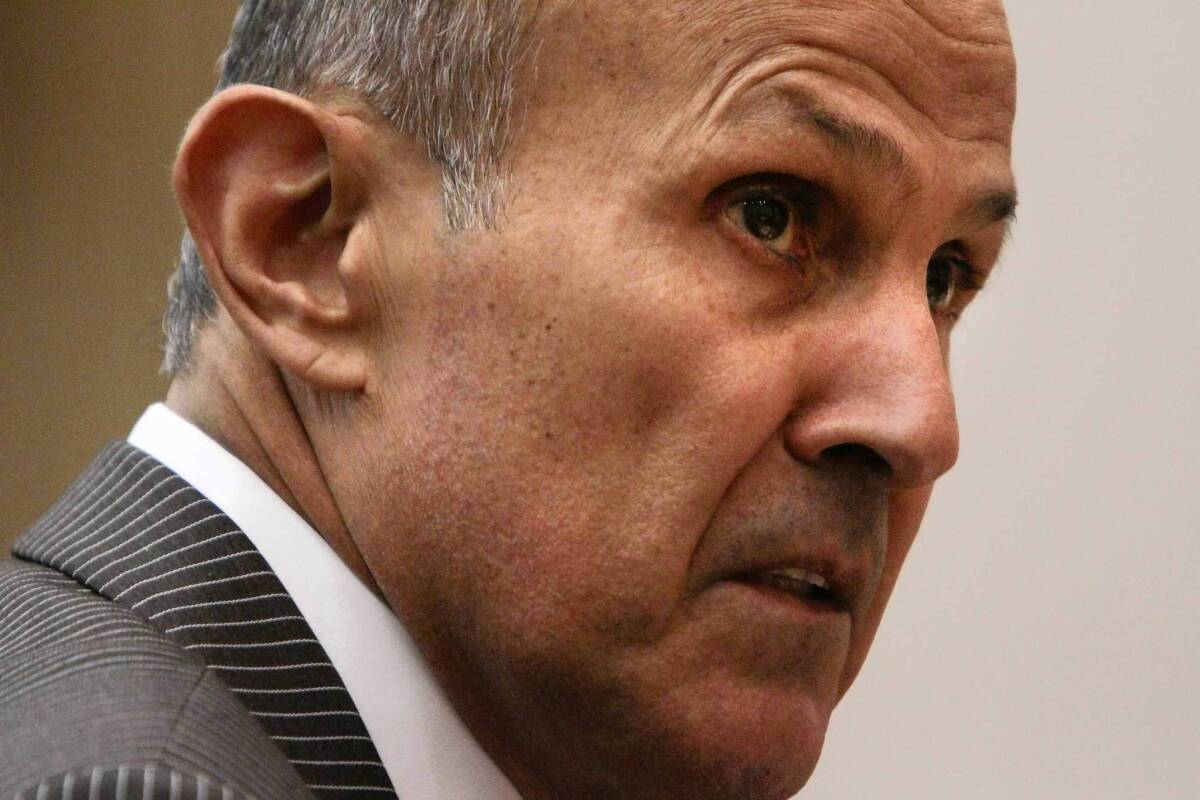L.A. County Sheriff Lee Baca accepts some blame for jail problems

- Share via
Under tough questioning, Los Angeles County Sheriff Lee Baca and his top assistant Friday told a blue-ribbon panel investigating deputy abuse that they failed to uncover problems roiling the nation’s largest jail system.
Baca, however, urged the commission to focus on solutions rather than dwelling on past shortcomings.
“We know we screwed up in the past,” Baca told members of the county Citizens’ Commission on Jail Violence. “I’m a guy that says let’s go forward.... I just need this commission to understand the limits of digging up dirt that doesn’t have any water going into it.”
Baca’s testimony marked the most extensive public questioning he has faced about his management style and knowledge of problems inside the lockups since it was revealed last year that federal authorities were investigating allegations of deputy abuse of inmates.
Sounding apologetic and testy at times, Baca complained that his underlings had kept him unaware of their concerns that deputies abused inmates and covered up misconduct.
When one commissioner sought answers about a spike in use-of-force incidents at the jail, Baca interrupted: “What good does it do to talk about it now?.... We can look at a lot of charts and say, ‘Gee, if you saw this, why didn’t you just go right into action?’
“I’m one person and I’ve got a department that’s full of opportunities for mistakes,” he said.
At another point, Commission Counsel Richard Drooyan asked Baca: “If you’re to blame, how do we hold you accountable?”
“Don’t elect me!” Baca retorted to cheers from a largely supportive audience of sheriff’s officials.
Baca also bristled when asked whether he was holding his command staff accountable for the problems in the jail.
“This commission is a great commission, Mr. Drooyan,” Baca responded. “But you’re not going to tell me how to discipline my people.”
Baca was preceded in his testimony by his top assistant, Undersheriff Paul Tanaka, whom some sheriff’s supervisors have blamed for fostering a culture of aggressive policing. Tanaka, who has largely avoided public comment about his role in the department, also expressed frustration that he was kept in the dark about misconduct. He also said some of his critics lied about his influence on the rank-and-file deputies.
Like Baca, however, he accepted blame for some of the agency’s problems.
“If I had done everything exactly as it should have been done … and I had been 100% diligent and looked into every possible aspect of our operation, we wouldn’t be here today,” Tanaka said.
Some of the commissioners expressed shock about Tanaka’s claims of ignorance of the jail’s problems, particularly on the allegations of excessive force.
“It seems to me everybody buried their head in the sand in regard to this issue,” said Commissioner Dickran M. Tevrizian Jr. “It’s very hard for a rational person to understand this.”
The long-awaited hearing comes after months of testimony received by the commission, which was appointed by the Board of Supervisors to examine allegations of misconduct in the jails.
Over the last few months, the panel has heard from former and current sheriff’s officials who have described a culture of violence in the jails.
In May, two retired sheriff’s supervisors recounted instances of deputies beating prisoners, ignoring bosses, forming cliques and engaging in off-duty misconduct. A captain, Daniel Cruz, who oversaw Men’s Central Jail, has also been blamed for turning a blind eye to deputy abuse, according to several witnesses.
One retired commander, Robert Olmsted, said he went to Baca with specific concerns about out-of-control deputies in the jail but was rebuffed.
On Friday, Baca attributed some of the problems at the jail to a personality clash between Olmsted and Cruz, who was his subordinate.
Drooyan pointed out that use-of-force incidents have dropped since public outrage over the jails grew and the sheriff instituted a task force to implement reforms. He asked the sheriff why he hadn’t implemented those reforms sooner.
“I’m not through with this innovation process,” Baca said. “When you start looking as deeply as I have, you’re gonna see a lot of things.”
More to Read
Sign up for Essential California
The most important California stories and recommendations in your inbox every morning.
You may occasionally receive promotional content from the Los Angeles Times.










